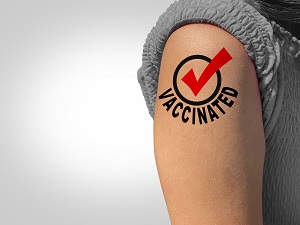Don't Wait, Immunocompromised Patients Advised to Get COVID-19 Vaccine Booster

DETROIT (August 18, 2021) – Henry Ford Health System advised people who are immunocompromised not to wait to get a COVID-19 vaccine booster that was recently approved for use by the Food and Drug Administration and Centers for Disease Control and Prevention.
The CDC recommends the booster for those who have moderately or severely compromised immune systems. This includes people in active cancer treatment, organ transplant or stem cell transplant recipients, and those with an advanced or untreated HIV infection.
“Studies showed that people with this degree of immunosuppression, where their white blood cells don’t fight off infections quite as well, they always don’t get great immunity with two doses of the vaccine,” Dennis Cunningham, M.D., System Medical Director of Infection Control and Prevention, said at a briefing with reporters Wednesday. “When you give a third dose of vaccine these antibodies start appearing, these protective proteins, and it made a huge difference in immunocompromised people.”
Only the Pfizer and Moderna vaccines are recommended for the booster shot at this time. People should receive the same vaccine as their first two doses. The booster should be given at least 28 days after the second dose.
Dr. Cunningham said the booster is “safe, effective and well tolerated.” He said Henry Ford is finalizing plans for administering boosters to its immunocompromised patient population, adding that local pharmacies and some municipalities are also offering it.
“Henry Ford agrees that boosters are a great idea for immunocompromised people,” he said. “We are 100% behind them. The science is strong.”
Also on Wednesday, the federal government announced that beginning the week of Sept. 20, booster shots will be made available for all adults ages 18 and older who are fully vaccinated with the Pfizer or Moderna vaccines. This third shot would be given eight months after the second dose. Studies have shown that initial immunity wanes over time from the first two doses. Henry Ford said it would be formalizing a plan in the coming weeks to administer booster shots to the general population.
“We’ll be prepared to administer booster doses to any of our of patients and employees once we get the green light from the FDA and CDC,” Dr. Cunningham said.
The approval of booster shots come as COVID hospitalizations continue to rise. Adnan Munkarah, M.D., Executive Vice President and Chief Clinical Officer, said hospitalizations across Henry Ford’s hospitals have increased four-fold in recent weeks. In addition to 88 patients hospitalized with COVID, another 15 patients are admitted awaiting a COVID test result.
The positivity rate is 9.4%, a significant increase from 3.6% seen on July 21, Dr. Munkarah said.
Her said the Delta variant is driving the surge in hospitalizations of people mostly unvaccinated. Henry Ford has seen a small number of breakthrough infections involving immunocompromised patients or the frail elderly.
Dr. Munkarah said an upward trend in vaccinations has offered a “glimmer of hope.” Henry Ford has administered on average about 1,500 doses of vaccine per week for the past four weeks. The uptick in vaccinations has also led to an increase in Henry Ford’s workforce vaccination rate. Currently, at least 85% of team members have received at least one dose.
With the FDA expected to give final approval to the Pfizer vaccine in the next few weeks, Dr. Munkarah said the upward trend of vaccinations should continue. He also advised those who are reluctant or hesitant to seek out trusted sources for reliable information about the vaccines.
“For those who are not vaccinated yet, our plea to you is please get vaccinated,” he said. “And for those who are vaccinated and those who are not, please lets make sure we follow all the protective measures that we have followed in the pandemic so we protect ourselves, we protect our community and put a stop to the spread of the Delta variant. This includes wearing a mask in indoor public settings when we are out grocery shopping, going to the hardware store and definitely in schools. Vaccination and masks are the best tools for us to move us forward.”
###
NEWS MEDIA ONLY may contact: David Olejarz / David.Olejarz@hfhs.org / 313-303-0606
About Henry Ford Health System
Founded in 1915 by Henry Ford himself, Henry Ford Health System is a non-profit, integrated health system committed to improving people’s lives through excellence in the science and art of healthcare and healing. Henry Ford Health System includes Henry Ford Medical Group, with more than 1,900 physicians and researchers practicing in more than 50 specialties at locations throughout Southeast and Central Michigan. Acute care hospitals include Henry Ford Hospital in Detroit, MI and Henry Ford Allegiance Health in Jackson, MI – both Magnet® hospitals; Henry Ford Macomb Hospital; Henry Ford West Bloomfield Hospital; and Henry Ford Wyandotte Hospital.
The largest of these is Henry Ford Hospital in Detroit, a quaternary care research and teaching hospital and Level 1 Trauma Center recognized for clinical excellence in cardiology, cardiovascular surgery, neurology, neurosurgery, and multi-organ transplants. The health system also provides comprehensive, best-in-class care for cancer at the Brigitte Harris Cancer Pavilion, and orthopedics and sports medicine at the William Clay Ford Center for Athletic Medicine – both in Detroit. As one of the nation’s leading academic medical centers, Henry Ford Health System annually trains more than 3,000 medical students, residents, and fellows in more than 50 accredited programs, and has trained nearly 40% of the state’s physicians. Our dedication to education and research is supported by nearly $100 million in annual grants from the National Institutes of Health and other public and private foundations.
Our not-for-profit health plan, Health Alliance Plan (HAP) provides health coverage for more than 540,000 people.
Henry Ford Health System employs more than 33,000 people, including more than 1,600 physicians, more than 6,600 nurses and 5,000 allied health professionals.
.svg?iar=0&hash=F6049510E33E4E6D8196C26CCC0A64A4)

/hfh-logo-main--white.svg?iar=0&hash=ED491CBFADFB7670FAE94559C98D7798)









